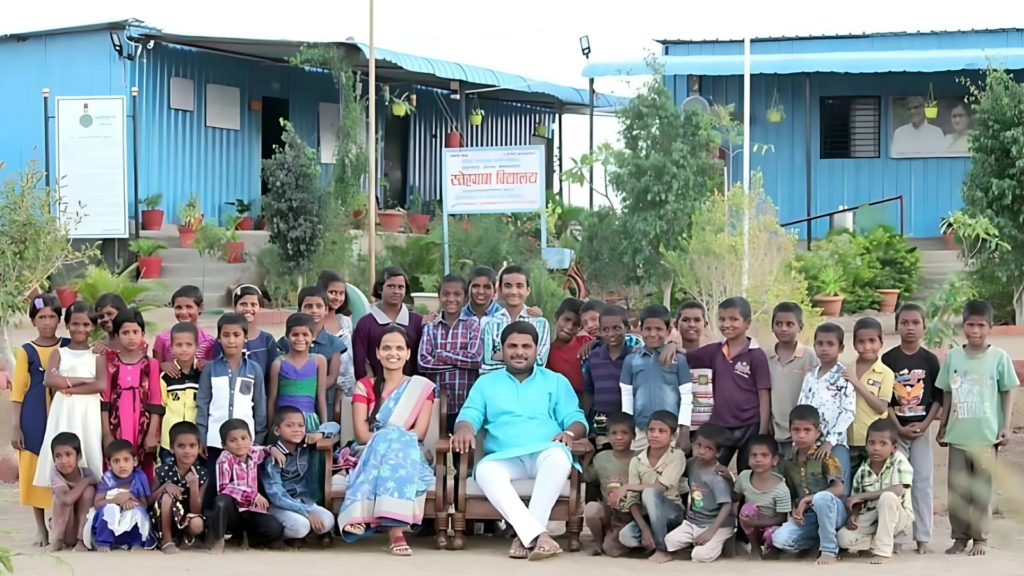Vinaya and Mahesh Nimbalkar, a teacher couple from Barshi, Solapur, have turned their lives upside down to give migrant children a shot at education. Their brainchild, Snehgram Democratic School, founded in 2015, is a beacon of hope for 42 kids who once lived on the streets, denied the right to learn. Vinaya and Mahesh Nimbalkar’s story is one of sacrifice, resilience, and an unshakable belief that every child deserves a future.

Their journey began in 2007, when, as government school teachers, they stumbled upon a slum three kilometers from Barshi. Over 100 children there had never seen a classroom, trapped in cycles of begging and labor. “It broke my heart,” Mahesh told The Better India, recalling his resolve to act. Weekends became teaching days in the slum, but resistance from parents, who demanded money to send their kids to school, tested their patience. By 2008, Vinaya left her job in Jalgaon to join Mahesh, leaving behind a stable life for a cause bigger than themselves.
The road to Snehgram was paved with hardships. The couple quit their jobs, drained their savings, and sold Vinaya’s jewelry to buy three acres in Korfale village in 2016. Starting with 25 kids in a rented space in Khandvi, they faced setbacks—eviction due to rising rent and the heartbreak of losing all their students to a private school’s minority quota in 2016. “It felt like everything was lost,” Mahesh admitted. But a chance meeting with Vikas Amte of Anandwan brought hope, funding five tin-shed rooms that revived Snehgram in 2017.
Snehgram isn’t just a school; it’s a microcosm of empowerment. Children like Sachin, a 12-year-old who arrived at six unable to read, now thrives in Class 6 and tutors others. The school, nestled in Solapur’s hills, offers more than academics. Kids learn vocational skills—cooking, budgeting, and tree-planting—while managing a student-run bank and mock judiciary. “We teach them to be self-reliant,” Vinaya says, emphasizing practical learning over rote memorization. With 1,000 saplings planted on their land, Snehgram also nurtures environmental consciousness.
The couple’s sacrifices are profound. Vinaya, born into a well-off family that lost everything, married Mahesh for his stable job, only to embrace a life of uncertainty. Operating on community donations—grains, vegetables, and occasional funds—they struggle to expand. A planned 1,020-square-foot building, budgeted at ₹12 lakh by engineer Abhijeet Kulkarni, remains stalled due to funding shortages. Yet, their spirit endures. “Good work finds support,” Mahesh says, buoyed by locals and crowdfunding efforts on platforms like DonateKart.
Vinaya and Mahesh Nimbalkar face ongoing challenges. With only two teachers—themselves—and limited infrastructure (two classrooms double as dorms), they’ve failed to hire help due to low pay. The 2020 COVID lockdown shuttered Snehgram, but 15 kids have since returned. Their model, inspired by democratic education, empowers kids to govern themselves, a rarity in India’s rigid school system, where 32% of rural children drop out before secondary school, per 2023 data.
Their story, trending on X as a symbol of social good, resonates with India’s push for inclusive education under the Right to Education Act. Like Yusuf Meherally Centre’s migrant schools, Snehgram fills gaps government policies often miss. Vinaya and Mahesh Nimbalkar’s mission proves that with heart and hustle, even the most marginalized can dream big. As they build a hostel to house more kids, their plea for support echoes: every donation can rewrite a child’s story.

